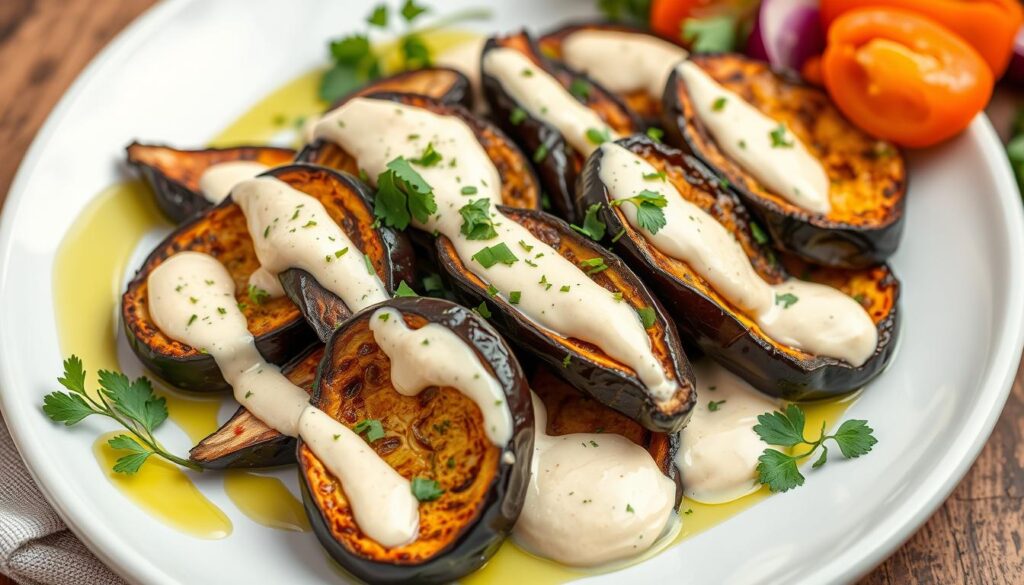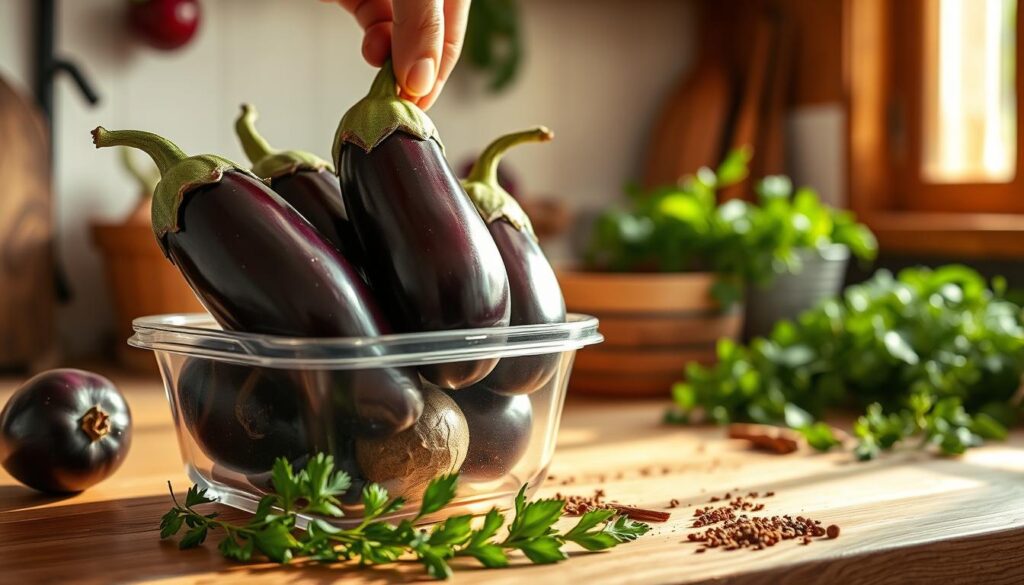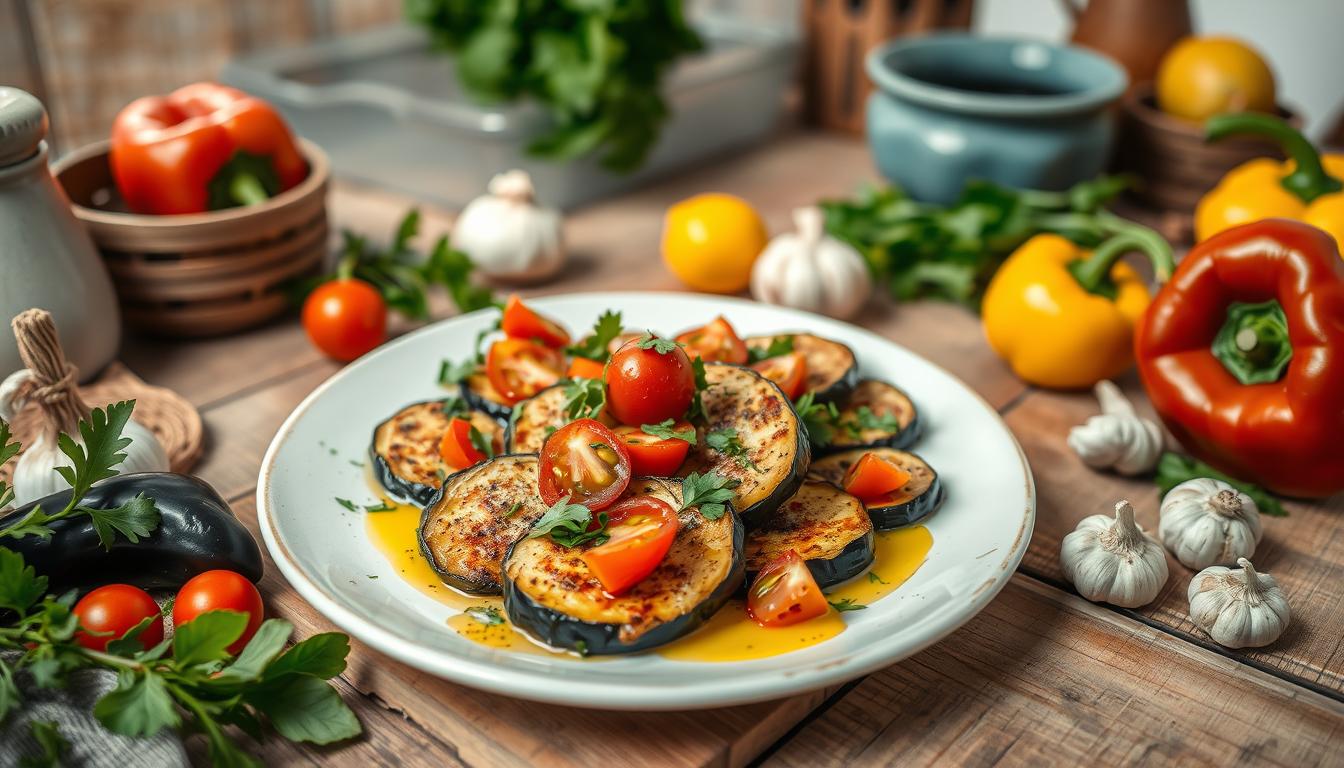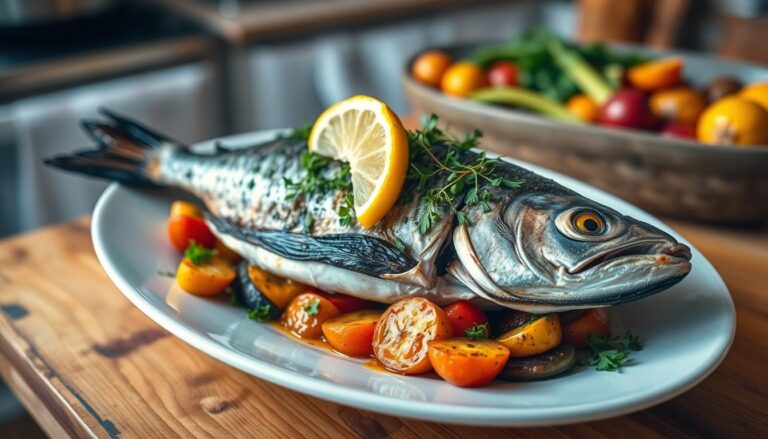Table of Contents
Imagine the warm sun on your face as the aroma of sautéed garlic and roasted eggplant fills your kitchen. It feels like you’re on the Mediterranean coast. This dish not only delights your senses but also nourishes your body.
The Mediterranean eggplant recipe is a tasty, healthy side dish for any time. With a few fresh ingredients, it turns eggplant into a flavorful main attraction. It’s loved by both vegetarians and meat-eaters. In just 30 minutes, it combines eggplant’s natural sweetness with vibrant herbs and spices.
This dish is not only delicious but also packed with nutrients. Thousands of fans have given it a 5-star rating. Discover the joy of Mediterranean cooking that can easily become a part of your daily meals.
Key Takeaways
- Explore over 21 eggplant recipes showcasing versatility in Mediterranean cuisine.
- Salting eggplant prior to cooking enhances flavor and texture.
- Consider a variety of cooking methods including roasting, grilling, and baking.
- Enjoy traditional dishes like moussaka and flavorsome dips such as baba ganoush.
- Healthy cooking tips are provided to make nutritious eggplant dishes.
Introduction to Mediterranean Eggplant
Mediterranean cuisine is known for its fresh ingredients and bold flavors. It uses healthy cooking methods and combines spices with vegetables. The eggplant is a key ingredient, used in many dishes.
It can be grilled, roasted, or turned into dips like baba ghanoush. This makes it a great base for many meals.
What Makes Mediterranean Cuisine Unique?
Mediterranean cuisine is special because of its diverse flavors and fresh produce. Each dish is influenced by local traditions and what’s in season. This ensures the food is always fresh and full of flavor.
Herbs like basil and mint, along with spices like Za’atar, add to the authentic taste. Olive oil is also crucial, enhancing flavors and promoting healthy eating.
The Versatility of Eggplant
Eggplant is incredibly versatile in cooking. It absorbs flavors well, making it a great addition to many dishes. You can find eggplant in everything from casseroles to salads.
In Mediterranean cooking, eggplant can be grilled, baked, or sautéed. This encourages creativity in the kitchen.
Eggplant’s flexibility has made it a staple in Mediterranean cuisine. Each way of preparing it brings out new flavors, enjoyed by many.
Ingredients Needed for the Recipe
Making a tasty Mediterranean eggplant dish starts with the right ingredients. These key items set the flavor and texture of the dish. Make sure to measure and prepare them before cooking. This makes the process smooth and fun.
Essential Ingredients
- 1 large eggplant (or 2 medium-sized eggplants), cut into half moons
- 2/3 cup extra virgin olive oil
- 1/2 tsp salt
- 1/4 tsp black pepper
- 1/2 tbsp dried thyme
- 1/2 tbsp dried oregano
- 3 cloves of fresh garlic, minced
- 2/3 cup balsamic vinegar
These ingredients make the dish rich and savory. The spices like thyme and oregano add to the Mediterranean taste.
Optional Ingredients for Added Flavor
Want to make your dish even better? Try adding some extra ingredients. Consider:
- Chopped dates for a touch of sweetness
- Fresh herbs like parsley or basil for garnish
Tahini sauce adds a creamy topping. A bit of garlic paste can also enhance the flavor. These additions make the dish memorable, whether for a family dinner or a special event.
Preparing the Eggplant
Before making eggplant into a tasty dish, it’s key to know how to prepare it right. Start by picking eggplant that’s fresh, firm, and has no blemishes. The right ways to slice and salt the eggplant boost its taste and texture. This makes it a great part of any Mediterranean meal.
How to Choose the Right Eggplant
Choosing eggplant needs some focus for the best taste. Look for:
- Firmness: The eggplant should feel solid to the touch.
- Shiny Skin: A glossy appearance indicates freshness.
- No Soft Spots: Check for bruises or wrinkles, which may suggest that the eggplant is overripe.
Globe eggplants are a top pick for Mediterranean dishes. They’re big and have a balanced taste.
Techniques for Slicing and Salting
How you slice eggplant affects its cooking. Try for 1-½-inch cubes to get even roasting. Salting the eggplant helps remove extra moisture and some bitterness. Here’s how to do it right:
- After slicing and cubing the eggplant, sprinkle salt generously over the pieces.
- Let it rest for approximately 10-15 minutes; this step is crucial in salting eggplant.
- Rinse the cubed eggplant under cold water to remove the salt and pat dry with a clean towel before cooking.
Salting is not required but it often makes the eggplant taste better. It makes the eggplant tender and less bitter. This step makes the dish more enjoyable.
The Cooking Methods for Eggplant
Exploring the best ways to cook eggplant can greatly affect its taste and texture. The right cooking method makes this versatile vegetable even more enjoyable. Popular methods include roasting, grilling, and baking, each with its own benefits.
Roasting Eggplant for Optimal Flavor
Roasting eggplant brings out its natural sweetness and makes it tender. You place cubed or halved eggplant on a parchment-lined baking sheet. Then, cook it at high temperatures, about 450°F.
It takes around 45 to 60 minutes for halved eggplants and 15 to 20 minutes for cubed ones in an air fryer. Thin slices roast faster and get a rich caramelization. Roasting makes flavors more concentrated, resulting in a delicious dish.
Grilling vs. Baking: What’s Best?
Grilling eggplant adds a smoky flavor that many love. It takes about 4 to 6 minutes per side when sliced. Baking eggplant is simpler, especially for making sauces.
Both grilling and baking produce tasty and versatile results. But roasting is often the top choice because it’s easy and consistently enhances flavor.
Creating Your Mediterranean Eggplant Dish
Making a Mediterranean eggplant dish is like creating a work of art. It’s all about layering flavors. Start by picking fresh eggplants with a firm texture and shiny skin. This makes sure the eggplant stays good during cooking and doesn’t taste bitter.
The first step is to toss diced eggplant in olive oil, garlic, and fresh herbs like basil. This creates a tasty base for your dish.
Layering Flavors: From Garlic to Herbs
In this recipe, garlic, fresh basil, and colorful bell peppers are key to the taste. Here’s how to layer flavors well:
- Toss eggplant cubes with 1/3 cup of olive oil, making sure each piece is well coated.
- Add 2-3 cloves of minced garlic and 1/2 teaspoon of salt for depth.
- Include 1 diced red bell pepper and 1 medium yellow onion for sweetness and texture.
- For a bit more flavor, add 1 tablespoon of ground coriander and 1 teaspoon of sweet paprika.
Time to Cook: Suggested Cooking Times
The prep involves baking the veggies at 375°F (190°C) for about 50 minutes. Eggplant slices usually cook for 3-5 minutes per side. Remember to flip the eggplant halfway through to roast evenly.
After cooking, mix the eggplant with diced tomatoes or halved cherry tomatoes. These add freshness and take about 8-10 minutes to cook. Serve the dish warm.
Suggested Sauces and Toppings
Tahini sauce is a creamy addition to Mediterranean eggplant dishes. It adds a nutty flavor that contrasts well with the eggplant. Making tahini sauce is easy and fast. You just need a few ingredients.
Mix a quarter cup of tahini with warm water, two cloves of garlic, two tablespoons of lemon juice, and a pinch of salt. This makes a smooth and tasty topping.

Tahini Sauce: A Creamy Addition
Tahini sauce is great for eggplant toppings because of its creamy texture. It goes well with roasted or grilled eggplant, making each bite richer. You can drizzle it over the eggplants or serve it on the side as a dip.
Fresh Herbs: Enhancing the Flavor Profile
Adding fresh herbs like parsley or cilantro can make the dish even better. They add freshness and color. Chopped herbs on top look good and taste great, adding to the tahini sauce’s flavor.
A sprinkle of pomegranate arils or walnuts can add to the look and feel of the dish. They bring different textures and tastes, making the meal more fun to eat.
Serving Suggestions
Serving Mediterranean eggplant can turn a simple meal into a feast. It pairs well with many Mediterranean dishes, making the meal more enjoyable. A well-presented dish can be the star of any gathering.
Perfect Pairings with Mediterranean Dishes
This Mediterranean eggplant dish goes great with:
- Grilled meats, such as lamb or chicken
- Falafel served with fresh tahini sauce
- A vibrant mezze platter featuring hummus, olives, and pita
These pairings blend flavors beautifully, adding to the Mediterranean dining experience.
Presentation Tips for a Beautiful Plate
To make your plate stand out, try these tips:
- Use a rustic serving dish for a traditional Mediterranean look.
- Garnish with fresh herbs like parsley or cilantro for color.
- Drizzle tahini over the warm eggplant for creaminess.
- Add pomegranate seeds or chopped dates for vibrant colors and sweetness.
Presenting the eggplant artfully with colorful garnishes makes it a stunning centerpiece for any meal.
Nutritional Benefits of Eggplant
Eggplant is not only versatile but also good for your health. It has few calories, making it great for weight management. A single cup (82 grams) of raw eggplant has only 20 calories. This makes it a guilt-free choice for any meal.
Low-Calorie, High-Fiber Snack
Eggplant is high in fiber, with 3 grams per cup. This fiber helps you feel full, so you can eat satisfying meals without too many calories. It also aids in digestion and supports overall digestive health.
Plus, eggplant is rich in vitamins and minerals like potassium and folate. These nutrients add to its nutritional value.
Rich in Antioxidants and Vitamins
Eggplants are full of antioxidants, especially anthocyanins. These fight oxidative stress and protect against free radical damage. Nasunin, a key antioxidant in eggplant, helps protect brain cells.
These antioxidants boost cellular health and may lower the risk of heart disease and some cancers. Adding eggplant to your meals can enhance flavor and provide vital nutrients for health.
Storing Leftovers
Proper care of leftover eggplant ensures its flavors last longer. Effective storing techniques help enjoy Mediterranean eggplant days after it’s made.
Best Practices for Refrigeration
Storing eggplant in the fridge requires an airtight container. This keeps it fresh for 4 to 5 days. Let the dish cool down first. This prevents moisture loss and keeps the taste intact.
Freezing Eggplant Dishes
Freezing is great for longer storage. Cool the eggplant dish to room temperature before freezing. Frozen eggplant stays good for three months. Just thaw it in the fridge and reheat gently.

Variations to Try
Trying different eggplant dishes can really spice up your cooking. You might enjoy Mediterranean eggplant bake or stuffed eggplant. Both let you add your own flair while keeping the Mediterranean taste.
Mediterranean Eggplant Bake
A Mediterranean eggplant bake is a mix of roasted eggplant, tomatoes, cheese, and spices. It’s a dish full of layers of flavor. Use a big eggplant, sliced and roasted, with tomatoes and Halloumi cheese for a tasty mix.
Put it in the oven at 400 degrees Fahrenheit for 45 minutes. This way, the eggplant and spices come together perfectly.
Stuffed Eggplant for a Hearty Meal
Stuffed eggplant is a great choice for a filling meal. You can fill it with chickpeas, grains, or a mix of veggies and spices. Try using chickpeas and farro for a protein-packed option.
Stuffed eggplant is all about making it your own. You can change up the ingredients to fit your diet. It’s a meal that’s both satisfying and nutritious.
Common Mistakes to Avoid
Knowing common eggplant cooking mistakes can make any dish better. Being aware of issues like overcooking and not salting the eggplant helps. Eggplant needs special care to taste great.
Overcooking Eggplant
Overcooking eggplant makes it soggy, ruining the dish. It soaks up liquid fast, so watch cooking times closely. Cook it until it’s tender but not mushy. It should be crispy outside and soft inside.
Skipping the Salting Process
Salting eggplant before cooking is key. It boosts flavor and cuts down moisture. Without it, the dish might taste bland and lack texture. Always salt the eggplant to keep your dish top-notch.
| Mistake | Consequence | Correction |
|---|---|---|
| Overcooking | Soggy texture | Monitor cooking closely |
| Skipping salting | Bland flavor | Always salt eggplant beforehand |
| Using excess oil | Greasy dish | Use minimal oil, one teaspoon is enough |
| Not peeling older eggplants | Tough texture | Peel larger, older eggplants |
| Overcrowding the pan | Poor browning | Space out eggplant pieces |
Conclusion: Enjoying Mediterranean Eggplant
The Mediterranean eggplant recipe captures the vibrant essence of Mediterranean cuisine. It’s easy to make a healthy, tasty dish with quality eggplants, roasting, simmering, and tasty sauces. Each serving has about 402 calories, making it a nutritious choice that’s full of flavor.
Readers should try Mediterranean eggplant and make it their own. Add fresh herbs or spices to give it a unique twist. Sharing this dish with friends and family makes the meal even better and creates a special moment together.
Start your cooking adventure with creativity and make the dish your own. With a bit of exploration, you can turn a simple eggplant into a highlight of any meal. Enjoy the journey and celebrate the Mediterranean’s rich flavors!
FAQ
What is a Mediterranean eggplant recipe?
How do I prepare eggplant for roasting?
What are some popular toppings for eggplant dishes?
Can I freeze leftover Mediterranean eggplant?
What are some variations of Mediterranean eggplant recipes?
How can I prevent overcooking eggplant?
Source Links
- https://www.themediterraneandish.com/eggplant-recipes/
- https://debraklein.com/roasted-eggplant-tahini/
- https://kalynskitchen.com/roasted-eggplant-with-mediterranean-salsa/
- https://www.themediterraneandish.com/grilled-eggplant-salad/
- https://feastingnotfasting.com/mediterranean-eggplant-salad/
- https://amiraspantry.com/eggplant-recipes/
- https://www.kitchenparade.com/2012/01/mediterranean-eggplant.html
- https://www.mediterraneanliving.com/melt-in-your-mouth-grilled-eggplant/
- https://thehiddenveggies.com/mediterranean-roasted-eggplant-recipe/
- https://mypureplants.com/mediterranean-grilled-eggplant/
- https://sharedappetite.com/recipes/mediterranean-eggplant-dip/
- https://www.alphafoodie.com/how-to-cook-eggplant/







